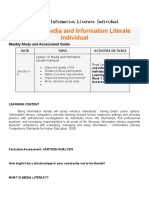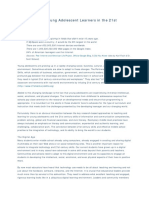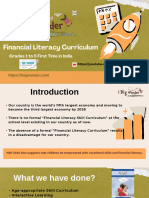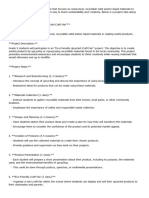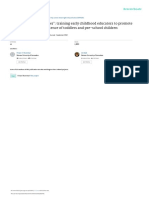Manfaat Literasi Informasi HANCOCK
Manfaat Literasi Informasi HANCOCK
Uploaded by
Miftahul HudaCopyright:
Available Formats
Manfaat Literasi Informasi HANCOCK
Manfaat Literasi Informasi HANCOCK
Uploaded by
Miftahul HudaCopyright
Available Formats
Share this document
Did you find this document useful?
Is this content inappropriate?
Copyright:
Available Formats
Manfaat Literasi Informasi HANCOCK
Manfaat Literasi Informasi HANCOCK
Uploaded by
Miftahul HudaCopyright:
Available Formats
ED358870 1993-05-00 Information Literacy for Lifelong Learning. ERIC Digest.
ERIC Development Team
www.eric.ed.gov
Table of Contents
If you're viewing this document online, you can click any of the topics below to link directly to that section.
Information Literacy for Lifelong Learning. ERIC Digest. INFORMATION LITERACY SHIFTS IN TEACHING AND LEARNING RESOURCES FOR INFORMATION LITERACY RESOURCES
2 4
6
ERIC 01,0
Digests
ERIC Identifier: ED358870 Publication Date: 1993-05-00 Author: Hancock, Vicki E. Source: ERIC Clearinghouse on Information Resources Syracuse NY.
Information Literacy for Lifelong Learning. ERIC Digest.
THIS DIGEST WAS CREATED BY ERIC, THE EDUCATIONAL RESOURCES INFORMATION CENTER. FOR MORE INFORMATION ABOUT ERIC, CONTACT ACCESS ERIC 1-800-LET-ERIC Beyond the basic skills of reading, writing, and arithmetic, the citizen/worker of the twenty-first century needs complex analytical skills. The technological tools of the Information Age--computer networks, telecommunications systems, and databases--have put an unprecedented volume of information at our fingertips. Yet how
ED358870 1993-05-00 Information Literacy for Lifelong Learning. ERIC Digest.
Page 1 of 8
www.eric.ed.gov
ERIC Custom Transformations Team
aware are we of what is available, when to use it, and how to find out about it? Education systems and institutions must take seriously the challenges of the Information Age. This includes restructuring the learning process to reflect the use of information in the real world, changing the role of the teacher from presenter of prefabricated facts to facilitator of active learning, and including the library/media specialist as a collaborator in curriculum planning for effective use of information resources.
INFORMATION LITERACY
For many years educators have heard about a variety of literacies--print, visual, computational, cultural, computer, scientific--and their importance in every child's education. Each of the literacies prescribes a process by which the learner can more easily negotiate the content unique to a particular area of study. Each of the literacies operates in isolation of the others, and each has its own vocabulary and conventions for study. Information literacy, on the other hand, is a potential tool of empowerment for all learners, reached through a "resource-based" learning approach. Briefly defined, information literacy is an individual's ability to:
ei
-recognize a need for information;
0
-identify and locate appropriate information sources;
ei
-know how to gain access to the information contained in those sources;
ei
-evaluate the quality of information obtained;
ei
-organize the information; and
ei
-use the information effectively. (Doyle, 1992) Information literacy programs encourage shifts in the roles of teachers and learners.
Page 2 of 8
ED358870 1993-05-00 Information Literacy for Lifelong Learning. ERIC Digest.
ERIC Resource Center
www.eric.ed.gov
Such changes are essential to prepare learners to live and work in an information-centered society.
SHIFTS IN TEACHING AND LEARNING
In an information literate environment, students engage in active, self-directed learning activities, and teachers facilitate students' engagement through a more adventurous style of instructional delivery. Students involved in information literate activities:
-seek a rich range of information sources;
0
-communicate an understanding of content;
ei
-pose questions about the content being learned;
ei
-use the environment, people, and tools for learning;
0
-reflect on their own learning;
ei
-assess their own learning; and
-take responsibility for their own learning.
These students feel good about themselves as learners, and they leave school feeling passionate about some content. Teachers trying to create an information literate environment for their students have given up the view that teaching is telling, that learning is absorbing, and that knowledge is static. They constantly make difficult choices about old curriculums, examining subject-area requirements closely, setting priorities, and considering process as well as content. They look beyond their classrooms for resources that will enrich the learning
ED358870 1993-05-00 Information Literacy for Lifelong Learning. ERIC Digest.
Page 3 of 8
www.eric.ed.gov
ERIC Custom Transformations Team
environment. They engage in collaborative activities which enrich their own professional development and their students' learning experiences. They seek the expertise of their school library media specialists as partners in the curriculum planning process. Teachers involve students in complex tasks that have purposes beyond the limits of the classroom and the teacher's critical evaluation. They also create collaborative situations to develop students' social skills and problem-solving skills. They are familiar with a variety of learning tools, both print-based and electronic, and they encourage their students to move beyond the textbook when seeking information and solving problems.
RESOURCES FOR INFORMATION LITERACY
Information literacy thrives in a resource-based learning environment. In such an environment, students and teachers make decisions about appropriate sources of information and how to access them. Aside from more traditional print resources--textbooks, encyclopedias, newspapers, magazines--they use technological resources such as videotape and videodisc, CD-ROM, software tools, and simulation/modeling tools. They use computer networking and telecommunications for both data access and participation in learning communities. They use multimedia technologies as materials for gathering data and as production tools. They use their school library media centers to locate and use many of these resources. In addition to using technological resources, learners also reach beyond classroom walls into their local communities for the rich supply of materials and authoritative information provided by businesses, social services agencies, citizens' groups, and public and university libraries. The mass media--cable and network television, radio broadcasts, and other national and international print and electronic services--provide yet another rich source for information. BENEFITS OF INFORMATION LITERACY
el
For Students:
Information literacy--and the resource-based learning programs that foster it--counteracts the information dependency created by traditional schooling, where students must rely on the teacher to dispense information. It requires active learning. Students take more control of their learning, and the teacher is freed from the role of omniscient expert. Yet the teacher becomes more important in the role of facilitator of interaction at the small-group or individual level. The final product of resource-based learning is usually a paper, presentation or exit performance. Regardless of where and how information literacy skills are acquired, they are applicable in any school, play, or work situation.
Page 4 of 8
ED358870 1993-05-00 Information Literacy for Lifelong Learning. ERIC Digest.
ERIC Resource Center
www.eric.ed.gov
Resource-based learning accommodates varied interests and ability levels. Students don't need to read exactly the same materials on the same topic when they are identifying their own approaches to a theme or topic of study. When teachers encourage students to do their own research, students take responsibility for their learning, and they retain more of the information they have gathered for themselves.
Information literate students are more effective consumers of information resources. They learn to recognize that information is packaged in a variety of ways, that it is packaged using a variety of techniques, that it serves a variety of interests, and that it contains a variety of value messages. Information literate students are more critical when they make decisions about the resources they use.
0
For Citizens:
Lengthening lifespans and increasing leisure time have altered the formula for what constitutes a productive, healthy, and satisfying life. To respond effectively to an ever-changing environment, people need more than just a knowledge base. They need techniques for exploring, making connections, and making practical use of information. Information-literate citizens know how to use information to their best advantage at work and in everyday life. They identify the most useful information when making decisions such as where to locate a business, how to vote, or whether to have a child. They are able to evaluate newscasts, advertisements, and political campaign speeches, recognizing when statistics are being used to support only one aspect of a complex issue. Current policy questions pose unprecedented complexity and international implications--immigration and "brain drain," the drug crisis, and the state of the environment. When statistics saturate all aspects of an issue, information literacy enables citizens to recognize deception and disinformation, so that they may make a truly informed decision. These citizens appreciate the value and power of information. They believe in the need for information to address problems and questions in their own lives, in their communities, and in society. They understand that information is not necessarily knowledge until it has been analyzed, questioned, and integrated into their existing body of knowledge and experiences. They are equipped to be lifelong learners because they know how to learn.
ei
For Workers:
The workplace of the present and future demands a new kind of worker. Reading and
ED358870 1993-05-00 Information Literacy for Lifelong Learning. ERIC Digest.
Page 5 of 8
www.eric.ed.gov
ERIC Custom Transformations Team
arithmetic ability simply are not enough. In a global marketplace, data is dispatched in picoseconds and gigabits. The deluge of information must be sorted, evaluated, and applied, and workers must be able to gather, synthesize, interpret, and evaluate. Lack of these skills currently costs business billions of dollars annually in low productivity, accidents, absenteeism, and poor product quality. Workers must be information literate. For the individual worker, the workplace has become a place of cataclysmic change and untold opportunity. Adapting to a rapidly changing work environment will mean multiple career and job changes. An early commitment to learning as a process, not as an end product, and the role information literacy plays in this process, will enable workers to see these changes as transitional, not traumatic.
RESOURCES
American Association of School Librarians and Association for Educational Communications and Technology. (1988). INFORMATION POWER: GUIDELINES FOR SCHOOL LIBRARY MEDIA PROGRAMS. Chicago: American Library Association, and Washington: Association for Educational Communications and Technology. ED 315
029.
AMERICAN LIBRARY ASSOCIATION PRESIDENTIAL COMMITTEE ON
INFORMATION LITERACY. FINAL REPORT. (1989). Chicago, Illinois:
American Library Association. ED 315 074. (Single copies are available free by writing ALA, 50 East Huron St., Chicago, IL 60611.)
Breivik, Patricia Senn. (1991, June-July). Literacy in an information society. COMMUNITY, TECHNICAL, AND JUNIOR COLLEGE JOURNAL, 61(6), 28-29, 32-35. Breivik, Patricia S., & Gee, E. Gordon. (1989). INFORMATION LITERACY: REVOLUTION IN THE LIBRARY. New York: ACE/Macmillan. Doyle, Christina S. (1992, June). OUTCOME MEASURES FOR INFORMATION LITERACY WITHIN THE NATIONAL EDUCATION GOALS OF 1990. FINAL REPORT TO THE NATIONAL FORUM ON INFORMATION LITERACY. SUMMARY OF FINDINGS. ED 351 033. Eisenberg, Michael B., & Berkowitz, Robert E. (1992, January). Information problem-solving: The Big Six Skills approach. SCHOOL LIBRARY MEDIA ACTIVITIES MONTHLY, 8(5), 27-29, 37, 42.
Haycock, Carol-Ann. (1991, May). Resource-based learning: A shift in the roles of
Page 6 of 8
ED358870 1993-05-00 Information Literacy for Lifelong Learning. ERIC Digest.
ERIC Resource Center
www.eric.ed.gov
teacher, learner. NASSP BULLETIN, 75(535), 15-22. Kuhlthau, Carol Collier. (1987). INFORMATION SKILLS FOR AN INFORMATION SOCIETY. Syracuse, New York: ERIC Clearinghouse on Information Resources. ED 297 740.
Written by Vicki E. Hancock, Assistant Director, Curriculum/Technology Resource Center, Association for Supervision and Curriculum Development (ASCD), Alexandria, Virginia. May 1993.
For further information on this topic, contact the National Forum on Information Literacy, Dr. Patricia Senn Breivik, Chair, c/o American Library Association, 50 East Huron St., Chicago, IL 60611.
ERIC Digests are in the public domain and may be freely reproduced and disseminated.
This publication was prepared with funding from the Office of Educational Research and Improvement, U.S. Department of Education, under contract no. RI88062008. The opinions expressed in this report do not necessarily reflect the positions or policies of OERI or ED. Title: Information Literacy for Lifelong Learning. ERIC Digest. Document Type: Information Analyses---ERIC Information Analysis Products (IAPs) (071); Information Analyses---ERIC Digests (Selected) in Full Text (073); Available From: ERIC Clearinghouse on Information & Technology, 4-194 Center for Science and Technology, Syracuse University, Syracuse, NY 13244-4100 (free). Descriptors: Access to Information, Citizenship Education, Education Work Relationship, Elementary Secondary Education, Futures (of Society), Information Dissemination, Information Literacy, Information Retrieval, Information Utilization, Lifelong Learning, Nontraditional Education, Student Responsibility, Teacher Role, User Needs (Information) Identifiers: ERIC Digests, Information Skills, Resource Based Learning ###
ED358870 1993-05-00 Information Literacy for Lifelong Learning. ERIC Digest.
Page 7 of 8
www.eric.ed.gov
ERIC Custom Transformations Team
[Return to ERIC Digest Search Page]
Page 8 of 8
ED358870 1993-05-00 Information Literacy for Lifelong Learning. ERIC Digest.
You might also like
- HPGD1103 Curriculum DevelopmentDocument15 pagesHPGD1103 Curriculum DevelopmentUina Jo100% (1)
- Ed300 Lesson Plan 1 1Document5 pagesEd300 Lesson Plan 1 1api-338549760No ratings yet
- Information LiteracyDocument21 pagesInformation LiteracyJov SoyomNo ratings yet
- Information LiteracyDocument2 pagesInformation LiteracyCaselyn OrantesNo ratings yet
- Media LiteracyDocument9 pagesMedia LiteracyStephany BendebelNo ratings yet
- ResearchDocument52 pagesResearchmaryjoy furtonNo ratings yet
- The Vast Amount of Information in Today's World Had Caused Problem Nowadays ThereforeDocument5 pagesThe Vast Amount of Information in Today's World Had Caused Problem Nowadays ThereforeTawana MaditshaNo ratings yet
- Essay For MIL!Document2 pagesEssay For MIL!Micha JugalbotNo ratings yet
- Information Literacy What Is Information Literacy? Thompson & HenleyDocument3 pagesInformation Literacy What Is Information Literacy? Thompson & HenleyMarco JavierNo ratings yet
- Information LiteracyDocument17 pagesInformation Literacygelolana18No ratings yet
- Learning Strategies and Motivational Factors Predicting Information Literacy Self-Efficacy of E-LearnersDocument17 pagesLearning Strategies and Motivational Factors Predicting Information Literacy Self-Efficacy of E-LearnersDalj Andrew Quinanahan SonsonaNo ratings yet
- Information Literacy, The Defining Paradigm of Modern EducationDocument3 pagesInformation Literacy, The Defining Paradigm of Modern EducationHannieNo ratings yet
- What Is Media Literacy?Document5 pagesWhat Is Media Literacy?gerryalto100% (1)
- Innovative Teaching StrategiesDocument97 pagesInnovative Teaching StrategiesRAYMON ROLIN HILADONo ratings yet
- Information Literacy: The Defining Paradigm of Modern EducationDocument18 pagesInformation Literacy: The Defining Paradigm of Modern Educationrose reyesNo ratings yet
- BRUCE - Information Literacy As A Catalyst For Educational ChangeDocument16 pagesBRUCE - Information Literacy As A Catalyst For Educational ChangeLunadiluaNo ratings yet
- INFORMATIONLITERACYnewDocument7 pagesINFORMATIONLITERACYnewhana suarezNo ratings yet
- Media Information Literacy: (Compare and Contrast)Document5 pagesMedia Information Literacy: (Compare and Contrast)arlene bobadillaNo ratings yet
- MODULE 3 - USE OF POPULAR MEDIA IN EDUCATION Without AKDocument31 pagesMODULE 3 - USE OF POPULAR MEDIA IN EDUCATION Without AKImyourbitchNo ratings yet
- Admin,+article 4Document19 pagesAdmin,+article 4Eric WONGNo ratings yet
- MIL Audio VisualDocument3 pagesMIL Audio VisualFunny JuanNo ratings yet
- Information Literacy Is The Set of Skills Needed To FindDocument1 pageInformation Literacy Is The Set of Skills Needed To FindTeddy NikolaiNo ratings yet
- Information Resources Are Defined As The Data and Information Used by AnDocument3 pagesInformation Resources Are Defined As The Data and Information Used by AnGito SehandraNo ratings yet
- ILLLDocument6 pagesILLLHuggins MuzvuweNo ratings yet
- Summary of Text Readings 2Document4 pagesSummary of Text Readings 2api-264394007No ratings yet
- 21st Century Literacies For TeachersDocument23 pages21st Century Literacies For TeachersRodel AringoNo ratings yet
- Information Literacy For Lifelong LearningDocument9 pagesInformation Literacy For Lifelong LearningcarloNo ratings yet
- Media and Information Literacy: ObjectivesDocument4 pagesMedia and Information Literacy: ObjectivesJAY BRYAN FLORESNo ratings yet
- Digital Literacy and Citizenship in The 21st CenturyDocument16 pagesDigital Literacy and Citizenship in The 21st CenturyaspentaskforceNo ratings yet
- RRL 11 22Document10 pagesRRL 11 22Yo, AngeloNo ratings yet
- Lynch Devin K. Saleng - It Lec Finals #2Document9 pagesLynch Devin K. Saleng - It Lec Finals #2Lynch Devin Kirtug-SalengNo ratings yet
- Media and Information Literacy: Allison C. Unisan, MbaDocument28 pagesMedia and Information Literacy: Allison C. Unisan, MbaYumeko Jabami100% (1)
- Daily Living SkillsDocument25 pagesDaily Living SkillsIqra AslamNo ratings yet
- Engaging Students Through ICT: A Multiliteracies ApproachDocument4 pagesEngaging Students Through ICT: A Multiliteracies Approachapi-27788847No ratings yet
- Clever Grant Psalm AntonioDocument5 pagesClever Grant Psalm AntonioMariecris Barayuga Duldulao-AbelaNo ratings yet
- Ensuring The Net Generation Is Net Savvy: ELI Paper 2: 2006Document19 pagesEnsuring The Net Generation Is Net Savvy: ELI Paper 2: 2006JonasNo ratings yet
- Amsic Integrated School: Purok 3, Brgy Amsic Angeles City, Pampanga Angeles City PampangaDocument13 pagesAmsic Integrated School: Purok 3, Brgy Amsic Angeles City, Pampanga Angeles City PampangaJuvilyn Rollan CarpioNo ratings yet
- Innovative Teaching StrategiesDocument97 pagesInnovative Teaching StrategiesRAYMON ROLIN HILADO100% (1)
- Enhancing Digital Literacy Through Presentation Technique Among 5th Grade Students.Document37 pagesEnhancing Digital Literacy Through Presentation Technique Among 5th Grade Students.Chaudhary Fahim RazaNo ratings yet
- 10.1002 tl.315Document12 pages10.1002 tl.315tinapik696No ratings yet
- The Expansion of The Information ProfessionDocument8 pagesThe Expansion of The Information ProfessionKnowledgeNo ratings yet
- AssignmentDocument9 pagesAssignmentfazlirehman92No ratings yet
- Arming Students Against Bad Information PDFDocument4 pagesArming Students Against Bad Information PDFDanielaNo ratings yet
- Assessment 5: Information Literacy Study Guide: Clear Consistent ConvincingDocument17 pagesAssessment 5: Information Literacy Study Guide: Clear Consistent ConvincingMichael BrocatoNo ratings yet
- What Is Media LiteracyDocument2 pagesWhat Is Media LiteracyJohn Paul MartinNo ratings yet
- 1.hum - Impact of Information Literacy Skills On The Academic Achievement of The StudentsDocument16 pages1.hum - Impact of Information Literacy Skills On The Academic Achievement of The StudentsImpact JournalsNo ratings yet
- Role of ICT in Higher Education and Its Challenges For The 21st CenturyDocument5 pagesRole of ICT in Higher Education and Its Challenges For The 21st CenturyarcherselevatorsNo ratings yet
- PR 2 Chapter 1 GabrielDocument15 pagesPR 2 Chapter 1 Gabrieljohnpaulian791No ratings yet
- Ils Notes 2021Document26 pagesIls Notes 2021Simbarashe NjekuNo ratings yet
- CHAP 1.introduction To EvaluationDocument31 pagesCHAP 1.introduction To Evaluationsiti nur ashikinNo ratings yet
- Investigative Report: Current Trends and Issues in TVL-ICT StrandDocument5 pagesInvestigative Report: Current Trends and Issues in TVL-ICT StrandAngelo TrucillaNo ratings yet
- Education EvolutionDocument10 pagesEducation Evolutionapi-277049086No ratings yet
- Week 2 - Media and Information Literate IndividualDocument7 pagesWeek 2 - Media and Information Literate IndividualDharyn Khai50% (2)
- Lecture OneDocument20 pagesLecture OnelangleyNo ratings yet
- Ilt BrochureDocument2 pagesIlt Brochureapi-273507073No ratings yet
- ILS Unit 1Document8 pagesILS Unit 1Tatendah ChamapiwaNo ratings yet
- ICT4E Article - ManualDocument32 pagesICT4E Article - Manualapi-3746513100% (2)
- Advocating For Young Adolescent Learners in The 21st CenturyDocument6 pagesAdvocating For Young Adolescent Learners in The 21st CenturyMarnella Ezra Banaag PadillaNo ratings yet
- HSC135 Study PackDocument93 pagesHSC135 Study Packnyasha gundaniNo ratings yet
- Closing the Gap: Digital Equity Strategies for Teacher Prep ProgramsFrom EverandClosing the Gap: Digital Equity Strategies for Teacher Prep ProgramsNo ratings yet
- Media Literacy for Young Children: Teaching Beyond the Screen Time DebatesFrom EverandMedia Literacy for Young Children: Teaching Beyond the Screen Time DebatesNo ratings yet
- Aisb Eal Language Continuum Grades 3-5Document7 pagesAisb Eal Language Continuum Grades 3-5api-244190788100% (1)
- Church Planter Training Program Essentials: Multiplication Network MinistriesDocument4 pagesChurch Planter Training Program Essentials: Multiplication Network MinistriesRaul CondoyNo ratings yet
- Financial Literacy For Kids & ChildrenDocument8 pagesFinancial Literacy For Kids & Childrensapna agrawalNo ratings yet
- Chapter 4: Curriculum Development: The Teacher and The School Curriculum A Guide To Curriculum DevelopmentDocument21 pagesChapter 4: Curriculum Development: The Teacher and The School Curriculum A Guide To Curriculum Developmenthannah mariNo ratings yet
- Evaluating Your Child For DysgraphiaDocument3 pagesEvaluating Your Child For DysgraphiaAnamaria BadeaNo ratings yet
- 2020 Syllabus Pap Algebra 2Document4 pages2020 Syllabus Pap Algebra 2api-293094846No ratings yet
- Basic Concepts Related To Social Work Definition and InterrelationshipsDocument17 pagesBasic Concepts Related To Social Work Definition and Interrelationshipscarmina pagoy100% (3)
- Grade 5 ProjectDocument4 pagesGrade 5 ProjectKerry NuñezNo ratings yet
- Q2 Grade 10 HEALTH DLL Week 1Document14 pagesQ2 Grade 10 HEALTH DLL Week 1Jesabelle San Juan100% (1)
- Practicum Evaluation Form MHC - Cianna Toms FinalDocument6 pagesPracticum Evaluation Form MHC - Cianna Toms Finalapi-316744816No ratings yet
- STEM AssignmentDocument4 pagesSTEM AssignmentMugz NeshNo ratings yet
- M3-Team Sports (Non-Traditional: Football, Futsal, Sepak Takraw)Document2 pagesM3-Team Sports (Non-Traditional: Football, Futsal, Sepak Takraw)Theresa Manglicmot PanemNo ratings yet
- Research GuideDocument50 pagesResearch GuideMark QuintoNo ratings yet
- CV-Nur Aulya Azzahrah Putri RasyidDocument1 pageCV-Nur Aulya Azzahrah Putri RasyidNur Aulya Azzahrah Putri RasyidNo ratings yet
- 3D in Coaching and MentoringDocument6 pages3D in Coaching and MentoringsnchezjosmanuelNo ratings yet
- Cooperative Learning Lesson PlanDocument7 pagesCooperative Learning Lesson PlanJulieNo ratings yet
- National Conference, 24-06-2023, FMTC, Mylapore in CollaborationDocument2 pagesNational Conference, 24-06-2023, FMTC, Mylapore in CollaborationCivil DreamNo ratings yet
- Rosenthal y Gatt 2010Document20 pagesRosenthal y Gatt 2010Patricia Jara ReyesNo ratings yet
- Math10 Day4Document2 pagesMath10 Day4Shaira Lou MirandaNo ratings yet
- Problem Solving PresentationDocument16 pagesProblem Solving Presentationsakhi niaziNo ratings yet
- The Effective Engineer How To Leverage Your Efforts in Software Engineering To Make A Disproportionate and Meaningful Impact PDFDocument210 pagesThe Effective Engineer How To Leverage Your Efforts in Software Engineering To Make A Disproportionate and Meaningful Impact PDFMUN UM SOCIETYNo ratings yet
- Grade 7 Lesson Plan On HeatDocument2 pagesGrade 7 Lesson Plan On HeatFord VirtudazoNo ratings yet
- 0 - CT071-3-3-DDAC - Module IntroductionDocument20 pages0 - CT071-3-3-DDAC - Module IntroductionGurmanterrSinghNo ratings yet
- Action Plan On Reading Intervention For Struggling ReadersDocument2 pagesAction Plan On Reading Intervention For Struggling Readersmarvin susmina100% (12)
- Wellness Massage 10 - Q4W2Document20 pagesWellness Massage 10 - Q4W2HENJEL PERALESNo ratings yet
- The Socratic Method As An Approach in Teaching Social Studies: A Literature ReviewDocument6 pagesThe Socratic Method As An Approach in Teaching Social Studies: A Literature ReviewAllan EstrelloNo ratings yet
- Exemplar Science Lesson Plan For Senior High School General Chemistry 1Document6 pagesExemplar Science Lesson Plan For Senior High School General Chemistry 1Arnel MetilloNo ratings yet
- Math-Q3-Week 6Document6 pagesMath-Q3-Week 6dorothy.mirandaNo ratings yet
- Lesson Plan Labelling PDFDocument3 pagesLesson Plan Labelling PDFMiguel Angel PonzeNo ratings yet




















































